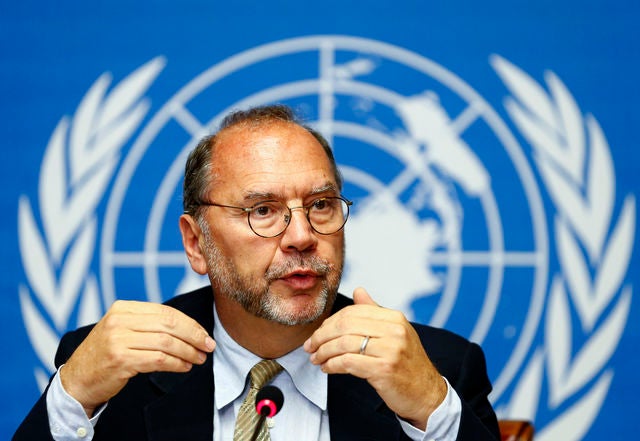Peter Piot explains the importance of 'ervaringsdeskundige'
The former London School of Hygiene & Tropical Medicine Director and Exemplars in Global Health Senior Advisory Board Member reflects on why experience is often the parent of expertise and why learning from what has worked, not just from failures, keeps him optimistic

Dr. Peter Piot has seen his share of hardship. As the former Director of the London School of Hygiene & Tropical Medicine, founding Executive Director of UNAIDS, and Under Secretary-General of the United Nations, his work has made him face – head-on – some of the biggest global health challenges of our time.
But Dr. Piot is a self-proclaimed optimist. He shares with Exemplars News why he became an Exemplars in Global Health (EGH) Senior Advisory Board member, and why rose-colored glasses are as essential as lived experience.
Why did you become involved with Exemplars in Global Health (EGH)?
Dr. Piot: I became involved with EGH to support a unique effort, to document real world evidence on what works in global health. It’s motivating to think about how the human experience can be affected by stories of success. I was born in Belgium, and there’s a Flemish word I use a lot: ervaringsdeskundige. It means an expert from experience. Exemplars is the ultimate ervaringsdeskundige. It tells us what has worked and what has not, from experience.
What has been the biggest surprise this work has revealed?
Dr. Piot: There is a wide diversity in the quality of the evidence base among very important health issues. This diversity in the quality of the evidence base also exists among countries, though that was not a surprise. In EGH, it’s been a reminder of both the great work that exists out there, and also, of better work that still needs to be done.
Prior to EGH, tell us about a time in your career when EGH research would have been useful?
Dr. Piot: Particularly when I was head of UNAIDS – though the evidence base for HIV interventions was in its infancy then – it would have helped to have had this kind of research. The AIDS virus is quite clever, and like many viruses, it works hard to evade us. I would have been eager to look at the virus from the perspective of positive outliers, to learn from the lesson of others so we could course-correct from our side.
How have exemplars (from EGH or otherwise) contributed to the work you're currently doing?
Dr. Piot: I think anything that gives you a better understanding of how extraordinary health outcomes are achieved is useful to inform policy advice. When I contracted COVID-19 during this pandemic, I experienced first-hand how essential multiple angles are to fully understanding a problem. We must look at global health challenges not just from the outside in, but also from the inside out. In some ways, this kind of research does that.
Not every solution is one-size-fits all. How can one best discern scalable lessons and apply them to individual circumstances?
Dr. Piot: One of the main lessons from EGH is that one size fits all is an illusion, and that context is extremely important. In reality, it’s a lesson most of us in public health already know. In the early days of AIDS, I remember learning the hard way that approaching a problem academically was not enough. We had to approach it socially, politically, and economically. We know that each country fighting whatever disease has its own context. Exemplars reminds us to localize, to adapt. Solutions can’t be scaled with a cookie-cutter. They have to consider the context.
What makes sharing data across country lines so challenging?
Dr. Piot: From politics to unequal quality of systems, data sharing is often spotty. It is improving, and much of that is because the world is understanding that for global solutions to exist, we need many voices at the table. And when people come to the table, they must be willing to share their data.
EGH research comprises literature reviews, qualitative and quantitative analysis – none of which are completely inaccessible to experts. Why has studying positive outliers not been a systematic practice in global health?
Dr. Piot: Global health has a tendency to focus on problems, not on what works well. I am an optimist. I have always been an optimist. And I think that makes me gravitate towards this kind of work. Not because it gives me rose-colored glasses. But because it allows me to learn from what has worked, not just from failures.
EGH research is different from a randomized controlled trial (RCT). What can the EGH approach identify/find that a traditional RCT might miss, and vice versa?
Dr. Piot: EGH is about the real world, and randomized controlled trials are about very well pre-determined study groups. We need both. Science and leadership require both.
What is the best starting advice you would give to experts seeking to improve a given health outcome? In the long-term, what is your hope for this work?
Dr. Piot: Some problems must be fought with all-out, coordinated efforts. We are seeing this with COVID-19. It’s the biggest issue of our time and it still does not feel like the world has a unified response. But for any public health challenge, I’d say this: it’s essential to integrate global solutions with local context, communicate with and listen to people, and ensure the politics are favorable.
In the long-term, what is your hope for this work?
Dr. Piot: I’d like to see this work expanded to the new major health challenges of our time. Things like obesity, diabetes, mental health, chronic conditions, and environmental health. There is a lot we struggle with on our planet, and there is a lot of work we need to do to achieve our full health potential. We don’t have to start from zero, though. There are many good lessons in each of these that we can already start learning from.
